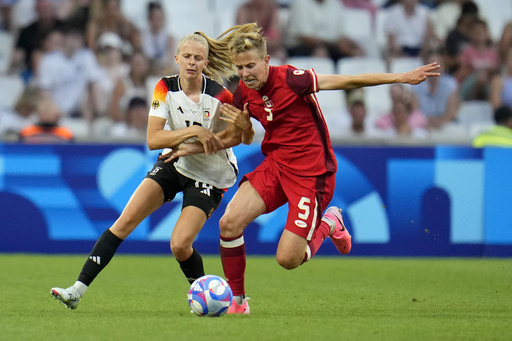President Donald Trump is escalating his efforts to address the participation of transgender athletes in women’s sports by taking the issue to the International Olympic Committee (IOC). During an executive order signing event, he expressed his desire for the IOC to “revise everything related to the Olympics concerning this absurd topic” in anticipation of the upcoming 2028 Summer Games set to be hosted in Los Angeles.
The executive order delegates authority to the Secretary of State’s office to urge the IOC to modify its regulations governing Olympic sports. The proposed changes aim to “promote fairness, safety, and the best interests of female athletes” by ensuring that eligibility for women’s sports is determined based on biological sex rather than gender identity or testosterone levels.
Furthermore, the order mandates that both the Secretary of State and the Department of Homeland Security “review and adjust policies,” if necessary, regarding the entry of individuals identifying as male who wish to compete in women’s sports within the United States.
The IOC has permitted transgender athletes to compete in the Olympics since 2004. However, it wasn’t until the 2021 Games that openly transgender athletes first participated under the Olympic banner. Thomas Bach, the IOC’s outgoing president, expressed confidence in December that the Olympic organizers could collaborate effectively with the Trump administration.
Initially, Trump supported Los Angeles when it sought the 2024 Games, which were ultimately awarded to Paris. Officials from the LA28 organizing committee did not respond promptly to a request for comment. Casey Wasserman, the chairman of the LA28 organizing committee, reportedly met with Trump in Florida last month prior to the start of his second term. Following their meeting, Wasserman indicated both parties were eager to ensure a successful Olympic Games.
Historically, the IOC has taken a backseat in the ongoing debate around transgender athletes, allowing individual sport governing bodies to set their own eligibility criteria. As a result, the regulations vary widely; for instance, World Aquatics enforces stringent guidelines, whereas World Triathlon has adopted a more lenient approach.
With Bach’s impending retirement, the IOC’s position on this issue may shift significantly. One potential successor is Sebastian Coe, a former track star and current leader of World Athletics, who has been vocal about limiting female sports participation to cisgender women. Under Coe’s leadership two years ago, track and field enacted a ban on transgender athletes competing in international competitions, mirroring similar regulations in swimming. Additionally, new rules were introduced, necessitating certain athletes to undergo hormone suppression for six months prior to competition for eligibility.
The conversation surrounding transgender participation intensified during the previous summer’s Paris Olympics, with Trump actively engaging in the discussion. On the campaign trail, he inaccurately referred to two female Olympic boxers as men, claiming their participation devalued women’s sports, despite both athletes—Imane Khelif from Algeria and Li Yu-ting from Taiwan—identifying as women and being assigned female at birth.
Referencing these athletes once more during the signing ceremony, Trump stated, “There were two individuals who transitioned and both won gold medals convincingly. But all that ends today with this executive order; the war on women’s sports is over.” Moving forward, the pivotal question remains what measures the United States will employ to exert influence over the IOC. Given the contentious nature of the discussion, Trump’s order may catalyze a movement among international federations advocating for the IOC to establish uniform participation standards.
